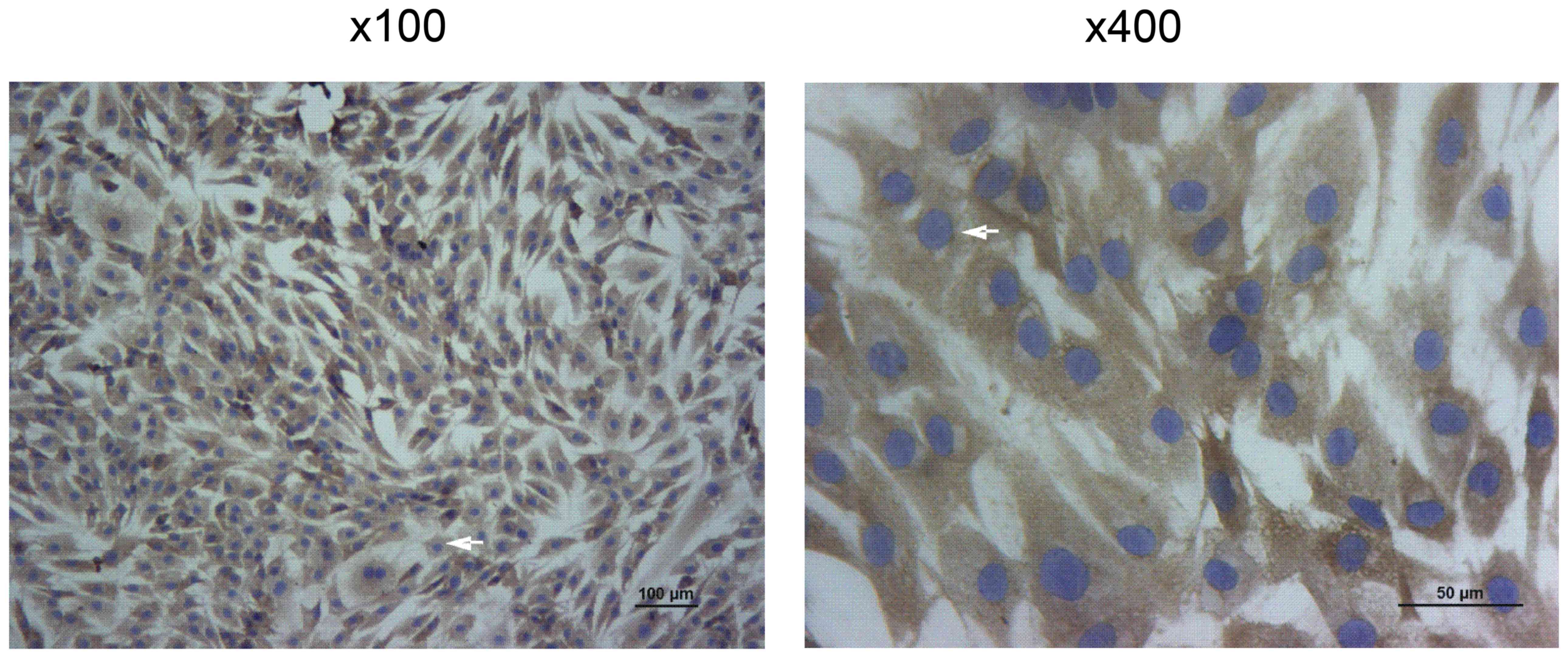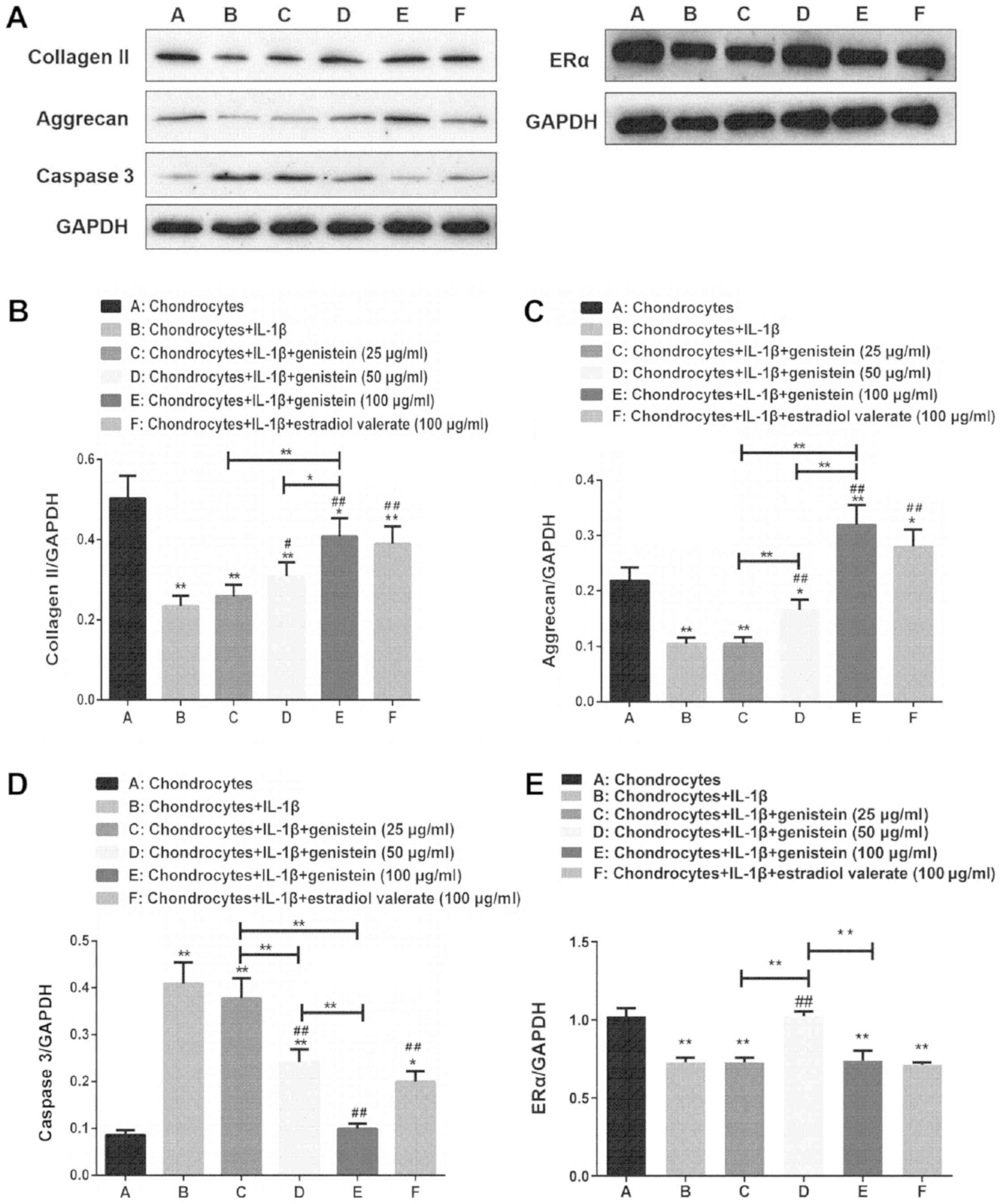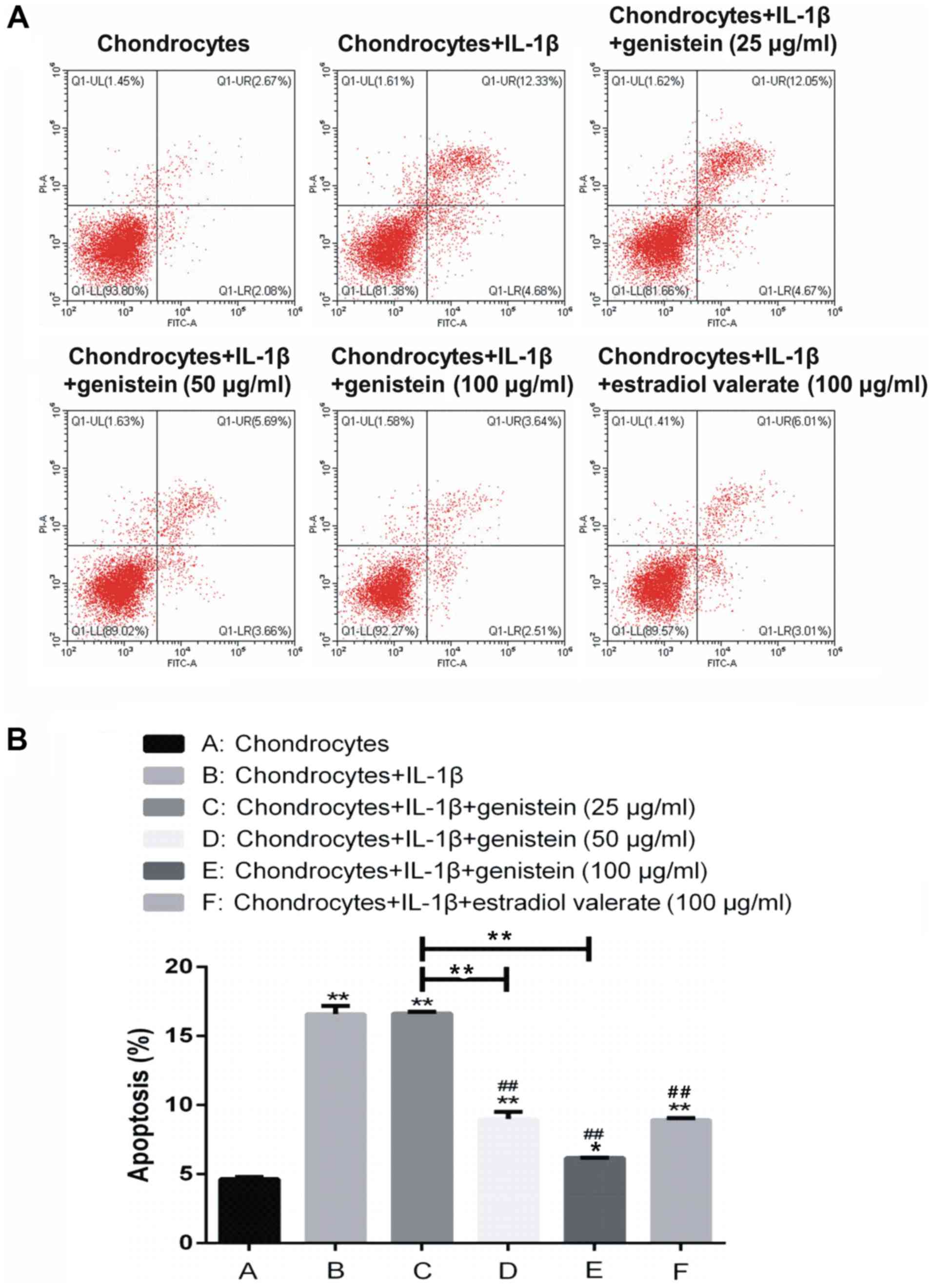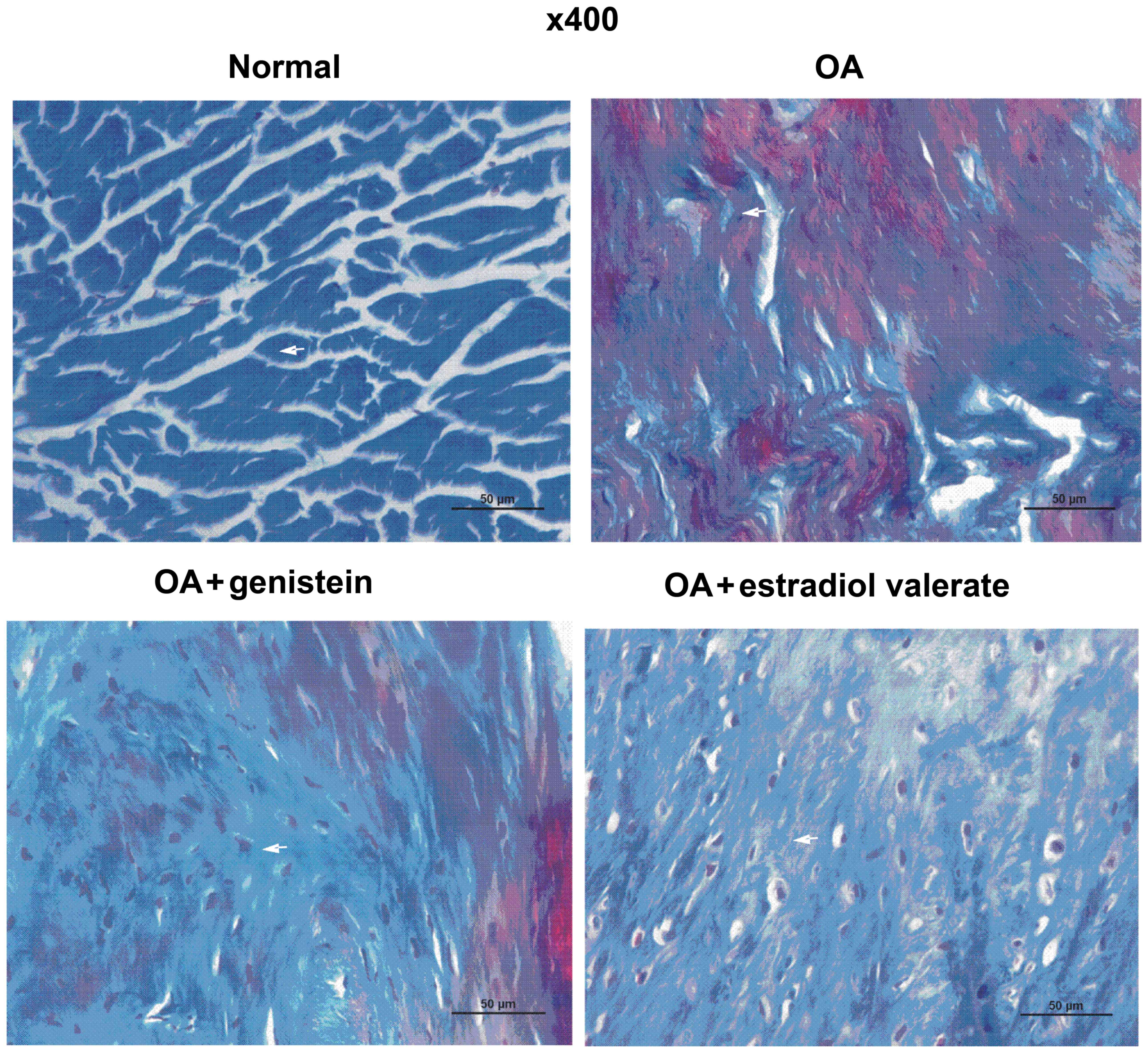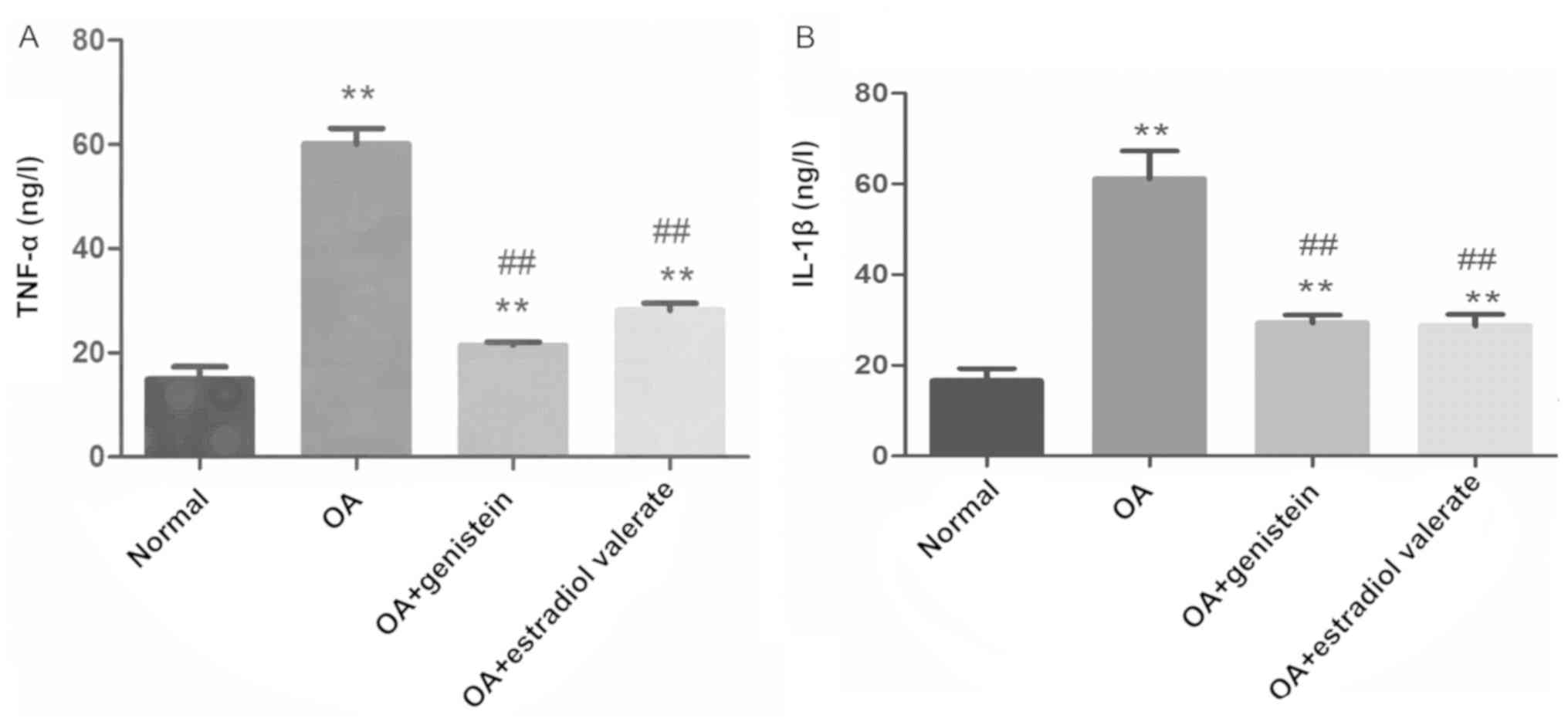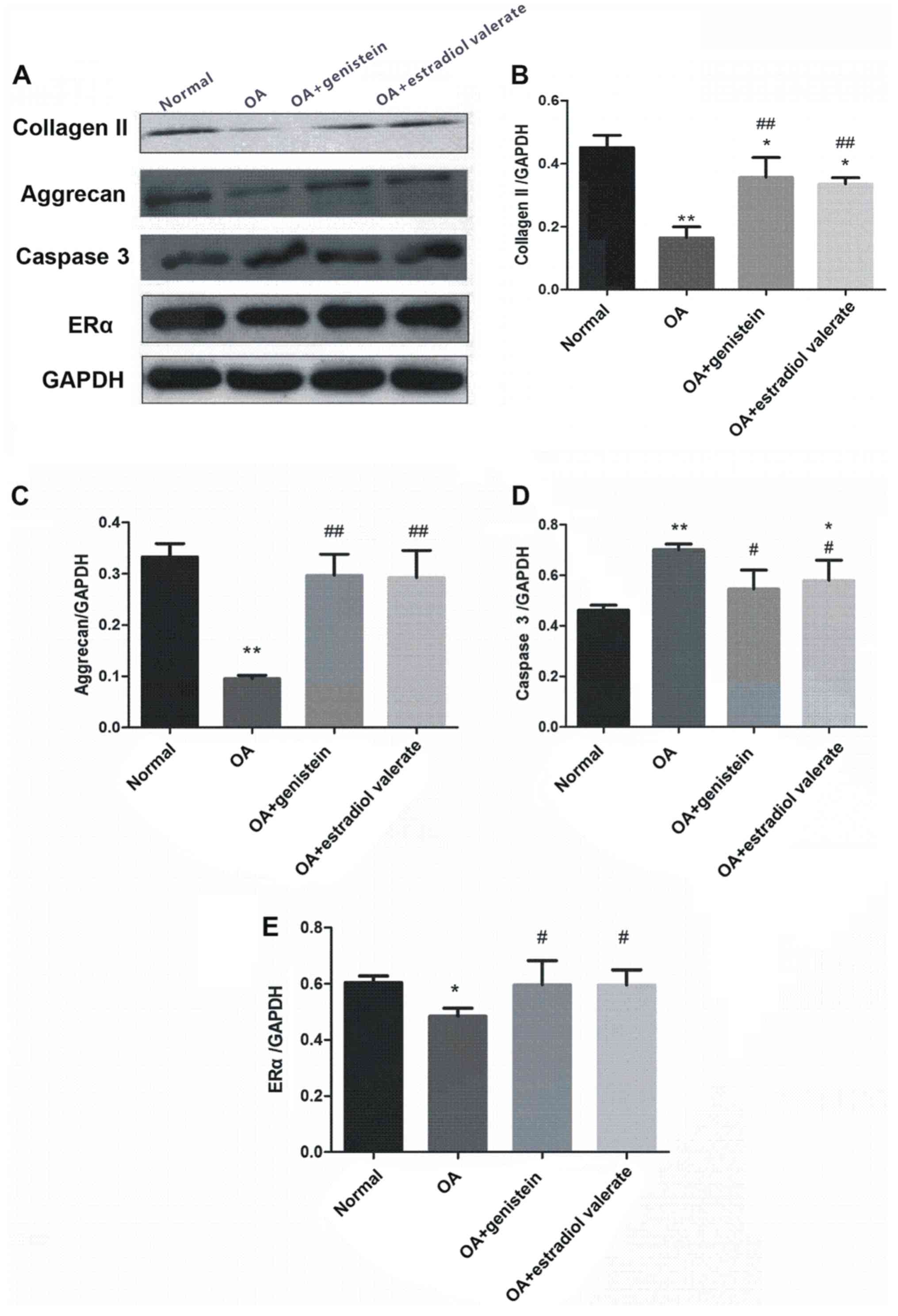|
1
|
Guilak F, Nims RJ, Dicks A, Wu CL and
Meulenbelt I: Osteoarthritis as a disease of the cartilage
pericellular matrix. Matrix Biol 71–72. 40–50. 2018. View Article : Google Scholar
|
|
2
|
Yang X, Guan Y, Tian S, Wang Y, Sun K and
Chen Q: Mechanical and IL-1β responsive miR-365 contributes to
osteoarthritis development by targeting histone deacetylase 4. Int
J Mol Sci. 17:4362016. View Article : Google Scholar : PubMed/NCBI
|
|
3
|
Whitworth DJ and Banks TA: Stem cell
therapies for treating osteoarthritis: Prescient or premature? Vet
J. 202:416–424. 2014. View Article : Google Scholar : PubMed/NCBI
|
|
4
|
Singer SP, Dammerer D, Krismer M and
Liebensteiner MC: Maximum lifetime body mass index is the
appropriate predictor of knee and hip osteoarthritis. Arch Orthop
Trauma Surg. 138:99–103. 2018. View Article : Google Scholar : PubMed/NCBI
|
|
5
|
Baker M, Brook BS and Owen MR:
Mathematical modelling of cytokines, MMPs and fibronectin fragments
in osteoarthritic cartilage. J Math Biol. 75:985–1024. 2017.
View Article : Google Scholar : PubMed/NCBI
|
|
6
|
Kaneva MK, Kerrigan MJ, Grieco P, Curley
GP, Locke IC and Getting SJ: Chondroprotective and
anti-inflammatory role of melanocortin peptides in TNF-α activated
human C-20/A4 chondrocytes. Br J Pharmacol. 167:67–79. 2012.
View Article : Google Scholar : PubMed/NCBI
|
|
7
|
Yao ZZ, Hu AX and Liu XS: DUSP19 regulates
IL-1β-induced apoptosis and MMPs expression in rat chondrocytes
through JAK2/STAT3 signaling pathway. Biomed Pharmacother.
96:1209–1215. 2017. View Article : Google Scholar : PubMed/NCBI
|
|
8
|
Johnson KA, Vemuri S, Alsahafi S, Castillo
R and Cheriyath V: Glycone-rich Soy Isoflavone Extracts Promote
Estrogen Receptor Positive Breast Cancer Cell Growth. Nutr Cancer.
68:622–633. 2016. View Article : Google Scholar : PubMed/NCBI
|
|
9
|
Liu FC, Wang CC, Lu JW, Lee CH, Chen SC,
Ho YJ and Peng YJ: Chondroprotective effects of genistein against
osteoarthritis induced joint inflammation. Nutrients. 11:E11802019.
View Article : Google Scholar : PubMed/NCBI
|
|
10
|
Oliviero F, Scanu A, Zamudio-Cuevas Y,
Punzi L and Spinella P: Anti-inflammatory effects of polyphenols in
arthritis. J Sci Food Agric. 98:1653–1659. 2018. View Article : Google Scholar : PubMed/NCBI
|
|
11
|
Pie JE, Park JH, Park YH, Ryu YM, Kim KN,
Suh SW, Becker KG, Cho-Chung YS and Kim MK: Effect of genistein on
the expression of bone metabolism genes in ovariectomized mice
using a cDNA microarray. J Nutr Biochem. 17:157–164. 2006.
View Article : Google Scholar : PubMed/NCBI
|
|
12
|
Wang Y, Wang H, Zhang W, Shao C, Xu P, Shi
CH, Shi JG, Li YM, Fu Q, Xue W, et al: Genistein sensitizes bladder
cancer cells to HCPT treatment in vitro and in vivo via
ATM/NF-κB/IKK pathway-induced apoptosis. PLoS One. 8:e501752013.
View Article : Google Scholar : PubMed/NCBI
|
|
13
|
Ma CH, Zhang YX, Tang LH, Yang XJ, Cui WM,
Han CC and Ji WY: MicroRNA-1469, a p53-responsive microRNA promotes
Genistein induced apoptosis by targeting Mcl1 in human laryngeal
cancer cells. Biomed Pharmacother. 106:665–671. 2018. View Article : Google Scholar : PubMed/NCBI
|
|
14
|
Du G, Song Y, Wei L, Li L, Wang X, Xu Q,
Zhan H, Cao Y, Zheng Y and Ding D: Osthole inhibits proliferation
and induces catabolism in rat chondrocytes and cartilage tissue.
Cell Physiol Biochem. 36:2480–2493. 2015. View Article : Google Scholar : PubMed/NCBI
|
|
15
|
Newcomer CE: The evolution and adoption of
standards used by AAALAC. J Am Assoc Lab Anim Sci. 51:293–297.
2012.PubMed/NCBI
|
|
16
|
Couto M and Cates C: Laboratory Guidelines
for Animal Care. Methods Mol Biol. 1920:407–430. 2019. View Article : Google Scholar : PubMed/NCBI
|
|
17
|
Zhou X, Zhang L, Guo X, Liu G, Wang G and
Fu S: A macaca fascicularis knee osteoarthritis model developed by
modified hulth combined with joint scratches. Med Sci Monit.
24:3393–3404. 2018. View Article : Google Scholar : PubMed/NCBI
|
|
18
|
King TJ, Shandala T, Lee AM, Foster BK,
Chen KM, Howe PR and Xian CJ: Potential effects of phytoestrogen
genistein in modulating acute methotrexate chemotherapy-induced
osteoclastogenesis and bone damage in rats. Int J Mol Sci.
16:18293–18311. 2015. View Article : Google Scholar : PubMed/NCBI
|
|
19
|
Wang W, Cui G, Jin B, Wang K, Chen X, Sun
Y, Qin L and Bai W: Estradiol Valerate and Remifemin ameliorate
ovariectomy-induced decrease in a serotonin dorsal raphe-preoptic
hypothalamus pathway in rats. Ann Anat. 208:31–39. 2016. View Article : Google Scholar : PubMed/NCBI
|
|
20
|
Rejtarová O, Hejna P, Soukup T and Kuchar
M: Age and sexually dimorphic changes in costal cartilages. A
preliminary microscopic study. Forensic Sci Int. 193:72–78. 2009.
View Article : Google Scholar : PubMed/NCBI
|
|
21
|
Li ZC, Han N, Li X, Li G, Liu YZ, Sun GX,
Wang Y, Chen GT and Li GF: Decreased expression of microRNA-130a
correlates with TNF-α in the development of osteoarthritis. Int J
Clin Exp Pathol. 8:2555–2564. 2015.PubMed/NCBI
|
|
22
|
Bergholt NL, Lysdahl H, Lind M and
Foldager CB: A standardized method of applying toluidine blue
metachromatic staining for assessment of chondrogenesis. Cartilage.
10:370–374. 2019. View Article : Google Scholar : PubMed/NCBI
|
|
23
|
Zhang W, Ouyang H, Dass CR and Xu J:
Current research on pharmacologic and regenerative therapies for
osteoarthritis. Bone Res. 4:150402016. View Article : Google Scholar : PubMed/NCBI
|
|
24
|
Wang XX and Cai L: Expression level of
proteoglycan, collagen and type II collagen in osteoarthritis rat
model is promoted and degradation of cartilage is prevented by
glucosamine methyl ester. Eur Rev Med Pharmacol Sci. 22:3609–3616.
2018.PubMed/NCBI
|
|
25
|
Bishnoi M, Jain A, Hurkat P and Jain SK:
Chondroitin sulphate: A focus on osteoarthritis. Glycoconj J.
33:693–705. 2016. View Article : Google Scholar : PubMed/NCBI
|
|
26
|
Barreto RB, Sadigursky D, de Rezende MU
and Hernandez AJ: Effect of hyaluronic acid on chondrocyte
apoptosis. Acta Ortop Bras. 23:90–93. 2015. View Article : Google Scholar : PubMed/NCBI
|
|
27
|
Mantovani V, Maccari F and Volpi N:
Chondroitin sulfate and glucosamine as disease modifying anti-
osteoarthritis drugs (DMOADs). Curr Med Chem. 23:1139–1151. 2016.
View Article : Google Scholar : PubMed/NCBI
|
|
28
|
Bonnet CS, Williams AS, Gilbert SJ, Harvey
AK, Evans BA and Mason DJ: AMPA/kainate glutamate receptors
contribute to inflammation, degeneration and pain related behaviour
in inflammatory stages of arthritis. Ann Rheum Dis. 74:242–251.
2015. View Article : Google Scholar : PubMed/NCBI
|
|
29
|
de Boer TN, van Spil WE, Huisman AM, Polak
AA, Bijlsma JW, Lafeber FP and Mastbergen SC: Serum adipokines in
osteoarthritis; comparison with controls and relationship with
local parameters of synovial inflammation and cartilage damage.
Osteoarthritis Cartilage. 20:846–853. 2012. View Article : Google Scholar : PubMed/NCBI
|
|
30
|
Kobayashi M, Squires GR, Mousa A, Tanzer
M, Zukor DJ, Antoniou J, Feige U and Poole AR: Role of
interleukin-1 and tumor necrosis factor alpha in matrix degradation
of human osteoarthritic cartilage. Arthritis Rheum. 52:128–135.
2005. View Article : Google Scholar : PubMed/NCBI
|
|
31
|
Santiago B, Baleux F, Palao G,
Gutiérrez-Cañas I, Ramírez JC, Arenzana-Seisdedos F and Pablos JL:
CXCL12 is displayed by rheumatoid endothelial cells through its
basic amino-terminal motif on heparan sulfate proteoglycans.
Arthritis Res Ther. 8:R432006. View
Article : Google Scholar : PubMed/NCBI
|
|
32
|
Chiu YC, Yang RS, Hsieh KH, Fong YC, Way
TD, Lee TS, Wu HC, Fu WM and Tang CH: Stromal cell-derived factor-1
induces matrix metalloprotease-13 expression in human chondrocytes.
Mol Pharmacol. 72:695–703. 2007. View Article : Google Scholar : PubMed/NCBI
|
|
33
|
Dondelinger Y, Darding M, Bertrand MJ and
Walczak H: Poly-ubiquitination in TNFR1-mediated necroptosis. Cell
Mol Life Sci. 73:2165–2176. 2016. View Article : Google Scholar : PubMed/NCBI
|
|
34
|
Vitale DC, Piazza C, Melilli B, Drago F
and Salomone S: Isoflavones: Estrogenic activity, biological effect
and bioavailability. Eur J Drug Metab Pharmacokinet. 38:15–25.
2013. View Article : Google Scholar : PubMed/NCBI
|
|
35
|
Basu P and Maier C: Phytoestrogens and
breast cancer: In vitro anticancer activities of isoflavones,
lignans, coumestans, stilbenes and their analogs and derivatives.
Biomed Pharmacother. 107:1648–1666. 2018. View Article : Google Scholar : PubMed/NCBI
|
|
36
|
Landete JM, Arqués J, Medina M, Gaya P, de
Las Rivas B and Muñoz R: Bioactivation of Phytoestrogens:
Intestinal Bacteria and Health. Crit Rev Food Sci Nutr.
56:1826–1843. 2016. View Article : Google Scholar : PubMed/NCBI
|
|
37
|
Nanashima N, Horie K and Maeda H:
Phytoestrogenic activity of blackcurrant anthocyanins is partially
mediated through estrogen receptor beta. Molecules. 23:E742017.
View Article : Google Scholar : PubMed/NCBI
|
|
38
|
Chinigarzadeh A, Karim K, Muniandy S and
Salleh N: Isoflavone genistein inhibits estrogen-induced chloride
and bicarbonate secretory mechanisms in the uterus in rats. J
Biochem Mol Toxicol. 31:e218782017. View Article : Google Scholar
|
|
39
|
Schwartz N, Verma A, Bivens CB, Schwartz Z
and Boyan BD: Rapid steroid hormone actions via membrane receptors.
Biochim Biophys Acta. 1863:2289–2298. 2016. View Article : Google Scholar : PubMed/NCBI
|
|
40
|
Parikka V, Lehenkari P, Sassi ML, Halleen
J, Risteli J, Härkönen P and Väänänen HK: Estrogen reduces the
depth of resorption pits by disturbing the organic bone matrix
degradation activity of mature osteoclasts. Endocrinology.
142:5371–5378. 2001. View Article : Google Scholar : PubMed/NCBI
|
|
41
|
Wang ZL, Sun JY, Wang DN, Xie YH, Wang SW
and Zhao WM: Pharmacological studies of the large-scaled purified
genistein from Huaijiao (Sophora japonica-Leguminosae) on
anti-osteoporosis. Phytomedicine. 13:718–723. 2006. View Article : Google Scholar : PubMed/NCBI
|
|
42
|
Ji G, Yang Q, Hao J, Guo L, Chen X, Hu J,
Leng L and Jiang Z: Anti-inflammatory effect of genistein on
non-alcoholic steatohepatitis rats induced by high fat diet and its
potential mechanisms. Int Immunopharmacol. 11:762–768. 2011.
View Article : Google Scholar : PubMed/NCBI
|
|
43
|
Honndorf VS, Wiehr S, Rolle AM, Schmitt J,
Kreft L, Quintanilla-Martinez L, Kohlhofer U, Reischl G, Maurer A,
Boldt K, et al: Preclinical evaluation of the anti-tumor effects of
the natural isoflavone genistein in two xenograft mouse models
monitored by [18F]FDG, [18F]FLT, and [64Cu]NODAGA-cetuximab small
animal PET. Oncotarget. 7:28247–28261. 2016. View Article : Google Scholar : PubMed/NCBI
|
|
44
|
Xu K, Sha Y, Wang S, Chi Q, Liu Y, Wang C
and Yang L: Effects of Bakuchiol on chondrocyte proliferation via
the PI3K-Akt and ERK1/2 pathways mediated by the estrogen receptor
for promotion of the regeneration of knee articular cartilage
defects. Cell Prolif. 52:e126662019. View Article : Google Scholar : PubMed/NCBI
|
|
45
|
Fytili P, Giannatou E, Papanikolaou V,
Stripeli F, Karachalios T, Malizos K and Tsezou A: Association of
repeat polymorphisms in the estrogen receptors alpha, beta, and
androgen receptor genes with knee osteoarthritis. Clin Genet.
68:268–277. 2005. View Article : Google Scholar : PubMed/NCBI
|
|
46
|
Son YO and Chun JS: Estrogen-related
receptor γ is a novel catabolic regulator of osteoarthritis
pathogenesis. BMB Rep. 51:165–166. 2018. View Article : Google Scholar : PubMed/NCBI
|
|
47
|
Tian L, Su Z, Ma X, Wang F and Guo Y:
Inhibition of miR-203 ameliorates osteoarthritis cartilage
degradation in the postmenopausal rat model: Involvement of
Estrogen Receptor α. Hum Gene Ther Clin Dev. 30:160–168. 2019.
View Article : Google Scholar : PubMed/NCBI
|
|
48
|
Xu X, Li X, Liang Y, Ou Y, Huang J, Xiong
J, Duan L and Wang D: Estrogen modulates cartilage and subchondral
bone remodeling in an ovariectomized rat model of postmenopausal
osteoarthritis. Med Sci Monit. 25:3146–3153. 2019. View Article : Google Scholar : PubMed/NCBI
|
|
49
|
Liang Y, Duan L, Xiong J, Zhu W, Liu Q and
Wang D, Liu W, Li Z and Wang D: E2 regulates MMP-13 via targeting
miR-140 in IL-1β-induced extracellular matrix degradation in human
chondrocytes. Arthritis Res Ther. 18:1052016. View Article : Google Scholar : PubMed/NCBI
|
|
50
|
Wang Q, Yan XB, Sun QQ, Hu AM, Liu HL and
Yin YW: Genetic polymorphism of the estrogen receptor alpha gene
and susceptibility to osteoarthritis: Evidence based on 15,022
subjects. Curr Med Res Opin. 31:1047–1055. 2015. View Article : Google Scholar : PubMed/NCBI
|















